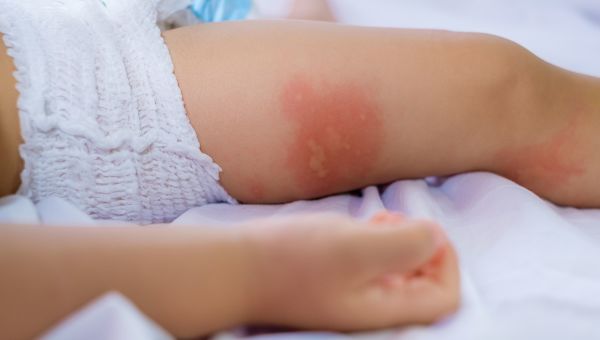6 symptoms you should never ignore in your newborn
Know when to take your infant to the pediatrician.
Updated on March 19, 2024

It can be a delicate balance when you’re a new parent. You may not want to call your pediatrician for every little hiccup, cough. or bump. But you also don't want to overlook potentially serious health issues.
So how do you know when your baby should be checked out by a medical professional? We spoke with William Thomas, DO, a family medicine physician in Christianburg, Virginia, to learn about some of the symptoms that may be cause for concern.

Fever
If an infant younger than 3 months has a fever—a rectal temperature higher than 100.4 degrees Fahrenheit or 38 degrees Celsius—it’s important that the baby be evaluated by their pediatrician. Healthcare providers (HCPs) will perform a physical exam, since a fever isn’t always going to indicate what is wrong.
Fevers typically happen when the body is fighting off some sort of infection. But regardless of their cause, they can be uncomfortable for your baby. When your child has a fever, they may need more fluids, have an increased heart rate, have difficulty sleeping, or may be more irritable than usual. Some of the most common conditions associated with newborn fevers include croup (infection of the upper airways that causes swelling around the vocal cords), pneumonia (infection of the lungs), ear infections, flu, colds, and sore throats. Fever can also be a sign of meningitis (inflammation of the membranes around the brain) and sepsis (a life-threatening emergency that can be triggered by an infection). Some conditions will require immediate medical attention, so you’ll want to call your HCP right away if your child has a fever.
Some babies and young children (between 2 to 5 percent of them) may experience febrile seizures. These convulsions, triggered by high fevers, can cause uncontrollable shaking, stiff arms and legs, eyes to roll back, and a brief loss of consciousness. Febrile seizures are more likely to occur if someone in your family has a history of them. Though most febrile seizures are harmless, children who have one may be more likely to have another. Seizures that last less than 15 minutes do not typically cause long-term health issues. Children who have had prolonged febrile seizures may be at higher risk for later epilepsy (a brain condition that causes seizures). If your child experiences a seizure from a fever, make sure they are in a safe place, such as the floor, remove anything from their mouth, like a pacifier, and call your pediatrician immediately. If the episode lasts for five minutes or more, call 911.

Constant crying or irritability
Crying is one of the only ways newborns can communicate with the outside world, says Dr. Thomas. But constant crying may mean something is wrong. “If babies are crying for hours on end, even after feedings or naps, they need to be evaluated,” he says.
For the first six weeks of life, it’s common for a baby to cry for up to three hours a day, according to the American Academy of Pediatrics. After that, one to two hours a day is typical. Most babies are fussiest between 6 p.m. and midnight. Crying that continues through the day and night or gets worse as time goes on may mean your child has colic. Babies who develop colic often cry inconsolably or scream for long periods of time, pull on their legs, and pass gas. The causes of colic are not well understood, but it may be a sensitivity to outside stimulation while the baby is not yet able to self-soothe. In some cases, a baby may be reacting to something the breastfeeding parent has eaten. Colic could also be a sign of a more serious health condition, such as a hernia (when a part of the body such as the intestine bulges through weakened or torn tissue), which is why you should always check with your pediatrician if crying gets worse.
Some strategies to comfort a baby with colic include:
- Try rocking them or walking them around in a carrier
- Introduce a pacifier
- Play steady, calming sounds like white noise, a dryer, or a fan
- Rub their back while holding them tummy-side down
- Swaddle them
- Consider eliminating caffeine, onions, and cruciferous vegetables such as cabbage, broccoli, and brussels sprouts from your diet. Try eliminating food items one at a time to see if it helps.
For some babies, probiotics work well as colic treatment, but always talk with your pediatrician before giving any supplement to your child.

Vomiting or excessive spit-up
Spitting up is a natural part of eating for a baby. Babies usually spit up because they are full, their bodies have changed positions after being fed, or they swallowed extra air during a feeding. This is common and doesn’t usually cause them discomfort. But if you notice that your baby is burping, spitting up, and then crying, or vomiting up a large amount of milk after feedings, bring them to your pediatrician’s office for an evaluation in case they have gastroesophageal reflux disease (when stomach acid goes backward from the stomach to the esophagus, the tube that carries food from the mouth to the stomach), advises Thomas.
You’ll also want to see your HCP if there is blood in the vomit or if your baby is having trouble gaining weight. These could be signs of two health conditions that require treatment: pyloric stenosis, which occurs when there is a blockage between the stomach and intestines, or esophagitis, which is inflammation of the esophagus.
You can help your baby by making sure they are sitting upright for feedings, burping them when they stop feeding, and limiting any jarring activities after meals. In other words, this is not the time to put them in the vibrating baby seat.

Low energy levels or inactivity
Newborns sleep a lot—up to 17 hours a day—but they should still wake every few hours to eat. “When your child is awake, they should be looking around and babbling and they should be startled by loud noises,” says Thomas. “Low energy means they just aren’t their normal, active self and aren’t as engaged with the world as they usually are.”
See your HCP if your baby exhibits any of these symptoms:
- Doesn’t wake up for feedings
- Requires a lot of effort on your part to wake
- Is lethargic when awake
- Is too weak to cry, make noise, or look at you

Rashes
Your newborn will be checked for rashes before they leave the hospital—specifically for anything bumpy, flat, red or scaly, says Thomas. If you notice any spots pop up later on, check in with your pediatrician. Redness or bumpiness could be baby acne (clogged hair follicles), eczema (inflammation of the skin), hives (itchy red bumps that indicate an allergy), or heat rash. Some of these conditions require treatment, while some will clear up on their own. Thomas recommends visiting your HCP immediately if your baby has a fever along with the rash, especially if the rash looks blister-like or wet, oozes, or is discolored.
Diaper rash is very common and can be managed by keeping your baby’s bottom dry, frequently changing diapers, and avoiding scented products that can irritate skin.

Unusual changes in stool
Changes in your baby’s stool color and consistency are very common. In fact, you’ll see a range of colors in their diaper before your baby starts to have formed bowel movements (usually when they start eating solid food). The first few days after birth, a newborn will pass a black, tarry substance called meconium. After a day or two of this, a breastfed baby’s stool typically turns dark greenish-yellow and has the consistency and appearance of mustard with seed-like bits in it. If your baby is formula-fed, their stools might turn yellowish-tan and look more pasty.
If you notice that your baby has bowel movements that are white, dark black, or red, see your pediatrician. Dark black stool that comes any time after the meconium has passed, or red stool, could indicate some sort of digestive bleeding, Thomas explains. You should also call your HCP if the baby’s stool is suddenly more frequent and runny or if the baby is having trouble passing any stool at all.
If you’re concerned, take note of the color, frequency, and consistency of your baby’s bowel movements so you can share these details with the pediatrician.

Mayo Clinic. Infant and toddler health. Last updated February 24, 2022.
National Institutes of Neurological Disorders and Stroke. Febrile Seizures. Accessed May 2, 2023.
American Academy of Pediatrics. Colic Relief Tips for Parents. Last updated April 25, 2022.
More On


video

article

slideshow


video


video
